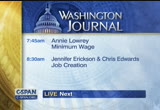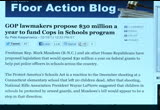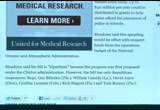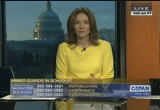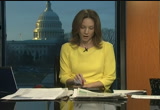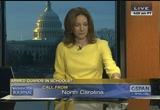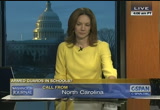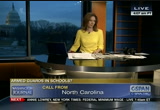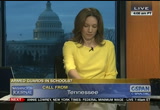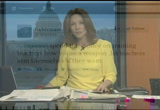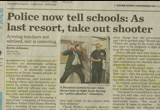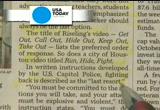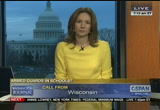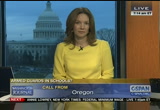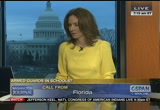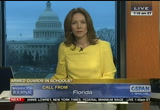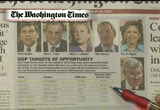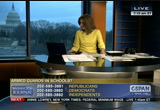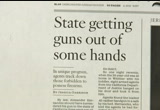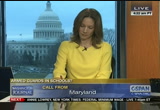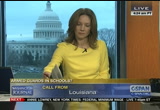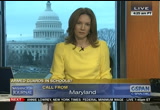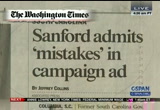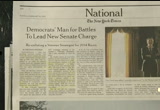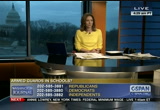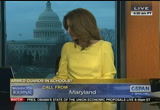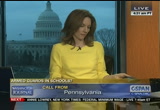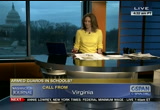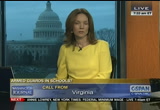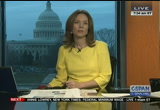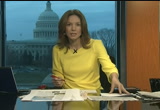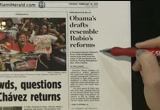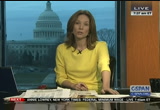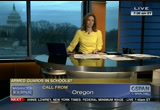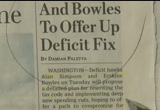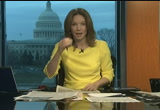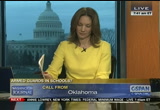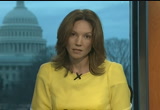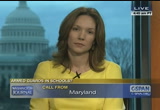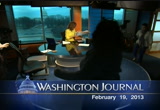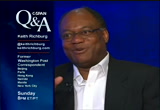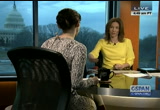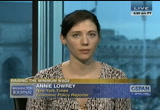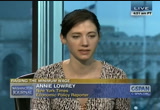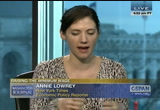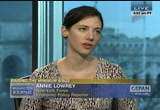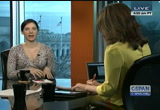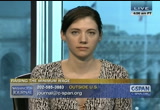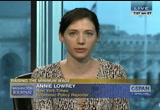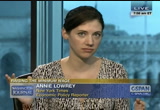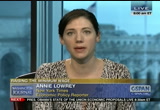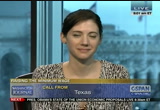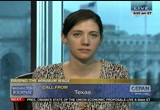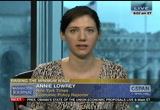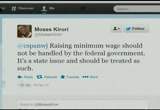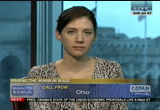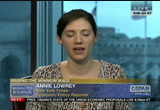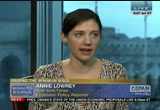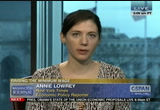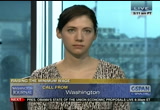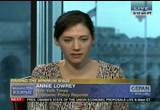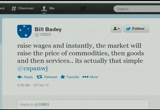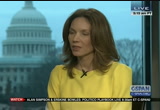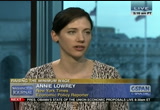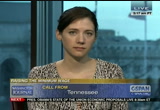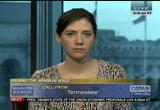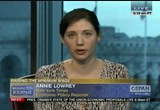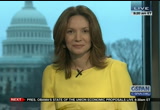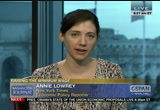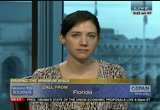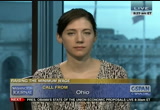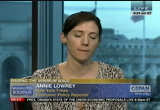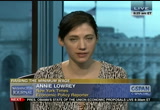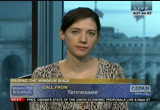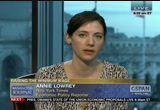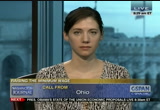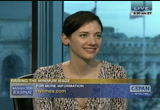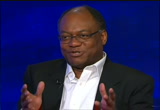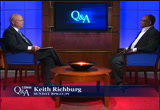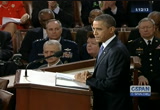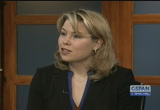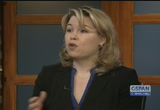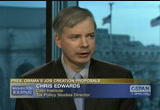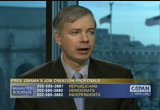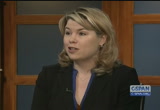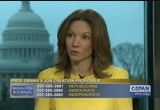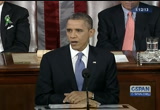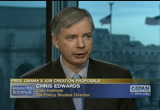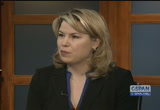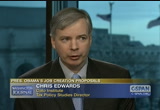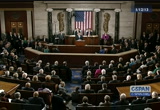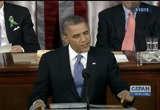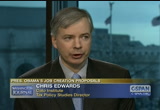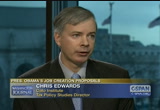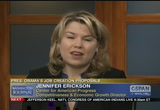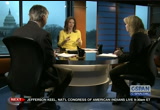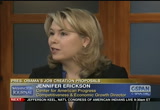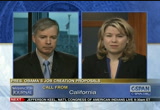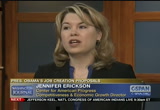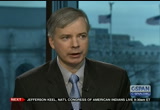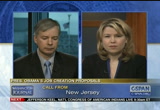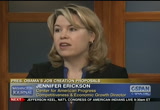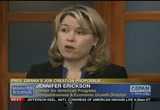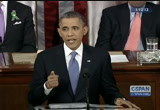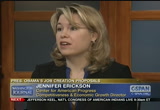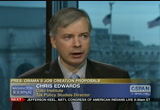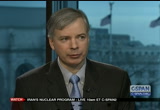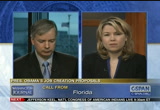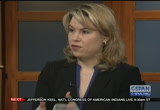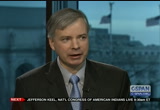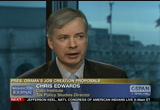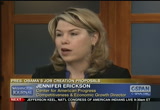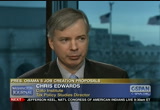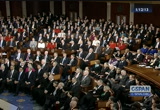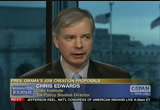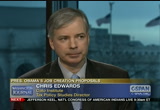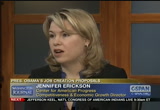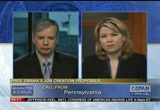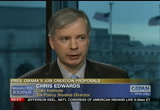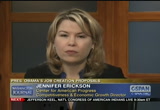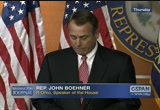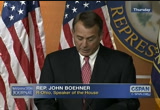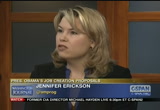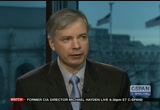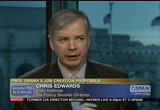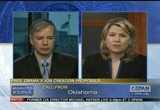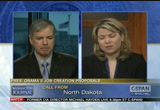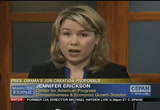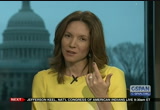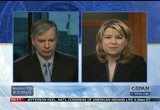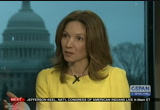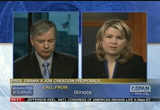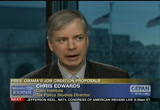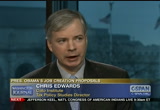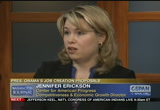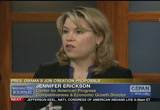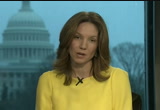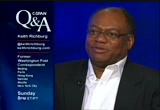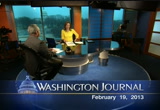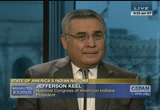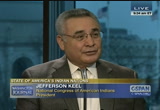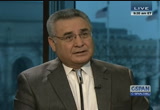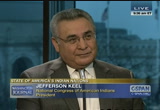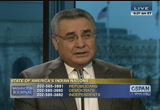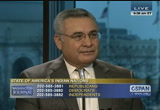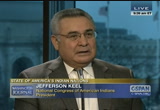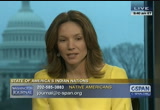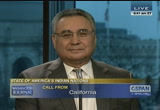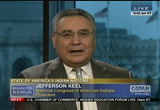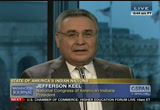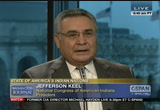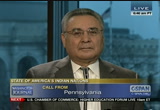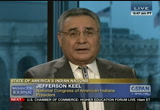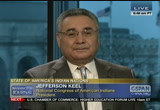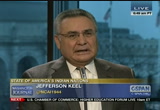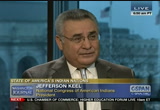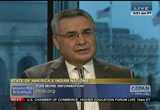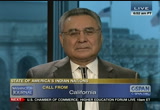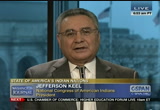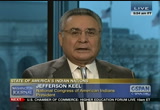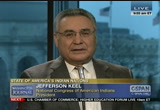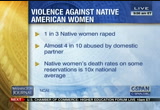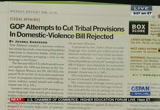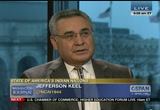tv Washington Journal CSPAN February 19, 2013 7:00am-10:00am EST
7:00 am
new york times"report her. then we will discuss the federal government's relationship ♪ host: good morning on this tuesday, february 19, 2013. the obama administration is walking back and immigration proposal after senate republicans said would hurt bipartisan efforts in congress. a handful of republican lawmakers in the house have proposed cutting spending $30 billion. should there be armed guards in schools? republicans this is your number
7:01 am
-- democrats -- and dependents -- educators -- send us a tweet @cspanwj. or send us an e-mail. we will begin this e-mail with the hill newspaper and the house and house republicans proposing $30 million a year to fund cops in schools' programs. mark meadows and six other house republicans have proposed legislation that it spent $30 million a year on federal grants to help put police officers in schools across the country.
7:02 am
7:03 am
part of an overall effort to tighten gun laws. a democratic caller in florida, curtis, go ahead. caller: i'm a die-hard democrat, and i wish you would give democrats -- do not feel like it is fair. the issue of the armed guards, you're asking for cheaper -- i am active duty. i was in vietnam. you're asking for trouble. the media does it too much coverage -- what i mean, these guys in a fantasy world, i'm concerned that the media elevates it and put it in an
7:04 am
area where it is harmful to our children. get back to educating them. i feel that if you can do that, some of the irrational thought would probably cease. going back to my point, you're talking about a republican with his own proposal. the democrats, you cut them off. republicans, you let them voice their opinions. it is part of my mind set. i am a former educator. i have been in the trenches. we need to back off of this little bit. host: here are some comments on our facebook page. --
7:05 am
on our twitter page -- john, charlotte, n.c., a republican. caller: your twitter guy who wrote in about protecting jewelry stores and banks with armed guards, we protect our public officials too. the irony of the situation is to put a sign up at a school that says, this is a gun free zone, and when something happens, we come calling for somebody with a gun to protect us. there are officers and safety resource officers in a lot of schools already. these kids, it gives them a chance to bond with a law- enforcement officer and see that
7:06 am
they are there to protect them. i think it is a great idea. unfortunately, the root cause is where we need to go. we need to go to the mental health situation and realize that the deterioration of our country's morals had devalued the respect for human life. that is where the situation needs to be addressed. when you're talking about, some people say, we should allow concealed carry in schools, 26 states allow university students over 21 to carry you have toeapons, look at the value of the life. we allow our law enforcement officers to have 45 rounds. we want to limit individuals to 10 rounds. what makes the law enforcement officers life more valuable?
7:07 am
host: what is your experience with this topic? caller: i do not have any professional experience. i would consider myself a high information voter. i have a degree in political science and history. when you look at -- it gets back to our nature, the way we were brought up -- each individual has the right to protect themselves and their property. as long as we live in a state of war in our society and adhere to the norms and laws, that is where we do not break down. unfortunately, our devaluation of our moral compass has created the situation we are in. i agree with the congressperson from north carolina that we need to fund it statewide or even have a local, directed part of the sales tax or other tax dedicated to these resource officers. host: tommy in tennessee, an
7:08 am
independent. caller: good morning. it never phases me how a debate like this goes on the -- goes on, and how many opinions i hear. in this country, we lose sight of the basic problem that put us in this position. as i have been observing or the past several weeks when all this was going on tv, the so-called experts are talking about this -- nobody mentioned the common thread that happens in these situations. one of the common things i have seen is that their primary problem is the psyche of white
7:09 am
males in this country. that is a common thread that plays out. the mass media never wants to come from that angle. host: what should be done about that? caller: we have to look at the underlying reasons why children, kids, people have tendencies to want to got and mass tell people -- mass kill people. host: to you agree with armed guards in schools? caller: know, that is only another political way -- no, that is only another political way of diverting funds and not going to a solution. host: on twitter -- the front page of the denver post --
7:11 am
7:12 am
7:13 am
house, proposing $30 million a year for this. ron, in wisconsin, a democratic column. caller: i am against the whole thing. $30 million -- how many guards in how many schools in this country? i think there is a better means to secure our children. i hate to use this as an example, but we're building prisons right now with electronic locks. why can we not have all the doors in the whole school building be updated with electronic locks? if somebody comes and approaches the school, you can push the panic button, a lot down the whole school, and automatically call the police at the same time.
7:14 am
i know this seems kind of a sword, but it is easy to monitor -- weird, but it is easy to monitor. you have a direct line with the police. why can we not do that for an emergency and have the police sent there as -- at the first indication of our problem? host: cory in oregon, are republican. caller: thank you for c-span. i think this idea of putting armed guards in schools -- it is kind of totalitarian. it made me think about how in basic is -- invasive is to the children of the schools, to have armed guards everywhere, and it is content -- going to set up in a situation of fear in
7:15 am
authority, not looking up to them. the consequences of this need to be looked at. what seems to be popping up in places, but not much is being done to talk about it, is the mental illness part. i personally am quite mentally ill. i can sympathize with some of these crazy people and how stressful and deteriorating it can be to one's life. this needs to be a much bigger part of the conversation. host: cory, thank you, we will go to shana a democratic color. -- shane, a democratic caller. caller: my thoughts on that, i do not support armed guards. we have a resource officer. that is what we need, resource
7:16 am
officers on campus. they can get the resource officer, and any problems pop up, he can take care of that. he also should be cooked, just in case somebody comes in there with an assault weapon -- equipped, just in case somebody comes in there with an assault weapon. some of these guys with magazines and assault weapons, they would be no match for him. i wonder what the nra take is on this. they would spend $30 million of taxpayers' money. what will they do? you need to have an assault weapon locked up and protected, because if somebody steals it and kill somebody, you're going to be responsible. it was the mom. she paid the ultimate price.
7:17 am
7:18 am
above the fold in the washington times, a story about president obama's agenda, risky to red state democrats, immigration reform, climate change, increasing taxes, including gun control, all risky to red state democrats. above their head line, they have a picture of the senator that republicans are targeting, mark romneyin alaska -- mitt got 55% of the 2012 vote. in arkansas, mark pryor, mitt romney with 60%. in louisiana, and mary landrieu, mitt romney got 57%. in montana, max baucus, mitt romney with 55% of the vote.
7:19 am
in north carolina, kay hagan up for reelection, mitt romney, about 51% of the vote. south dakota, tim johnson, mitt romney, 58% of the vote in 2012. these democrats, looking closely and hesitantly at president obama's agenda, on the issues he laid out in the state of the union address. also, a story about senator johanns, republican of nebraska, he has decided that he is not going to run for reelection in 2014. that is the story many papers have this morning. possibly the governor of that state could consider are wrong. senator mike johanns, not running in 2014. john in florida, an independent scholar. -- caller. caller: if they make these guns illegal, we have tens of millions of people in this
7:20 am
country that are here illegally, that we cannot seem to find, and we cannot keep tabs on them. how are we going to find these guns and keep these guns out? what about the illegal people that we cannot find that have illegal guns? host: let me throw this into what you said. "the washington post" frontpage has a piece about parts made for three -- for guns by 3-d printers -- what you think? -- do you tink -- think?
7:21 am
caller: this mess is confusing. nothing makes any sense anymore. who is the best liar? who has the best people behind them? that is what comes down to. host: wendy said that? -- why do you say that? caller: they are talking about getting guns out of here, yet we cannot get these people. . it is easier to hide a gun or a magazine. host: you might be interested in the story, in the "los angeles times" -- if somebody legally purchases a firearm, but later becomes
7:22 am
disqualified, agents in california are tracking these people down and retrieving the firearms from now. that is a "los angeles times." ban in maryland, are republican caller. caller: i like the idea of armed guards in schools, but only as a mitigation, not as a solution to the root of the problem. it's kind of like going to the doctor and he says, we need more tests, but we will give you something for the pain. the guards in schools is only something for the pain, while we get to the route. i would be interested to see -- the root. i would be interested to see for all the shootings, virginia tech, columbine, sandy hook, what was the family life like for those people? what was the marital status of their parents?
7:23 am
divorced, remarried? what i am trying to get at is that there are tons of studies that link -- your likeliest to commit crimes when you come from a broken home. that is more of the route -- the root. how do we strengthen the keystone of our society, our marriages? i would be interested on some of the marital status. host: a democratic caller, what are your thoughts? caller: it did not do anything for columbine. there was an armed guard there, and it did not save one life. you have two schools in three blocks, and there are armed guards standing there. it reminds me of the night -- a 19 terrorists who did what they want to do to the country.
7:24 am
benigno overkill, tea s.a., and all this other stuff -- then we go overkill, tsa, and this other stuff. it is never going to be right. if somebody is determined enough to go into a school and do what they did, they do not care. they can take care of the armed guard. host: why do you say it does not look right? caller: it looks like a military -- i am in new orleans. there were navy guards after katrina. you'll remember that click when the general came down. it is a very aggressive posture for people who are just going about their business and trying to live their lives. when you look at that as the
7:25 am
solution for a person to try to come into a school with armed guards standing at the doors, to me, it is putting lipstick on a pig. you're not getting to the root of the problem. host: john in maryland, an independent scholar. -- caller. caller: i am in favor of teachers and staff to be able to arm themselves. all the studies recently have shown that firearms are the best defense. having been able to defend themselves and the children in their charge, that is your best defense. you are right, you cannot have guards there. there is not enough money, or trading. allowing teachers and staff to arm themselves, if they wish to, gives them the ability to have unaffected defense. -- have an effective defense.
7:26 am
in college, students should be able to take it into their own hands. host: the idea of students having guns -- we do not let teenagers drive a car until they are 16. some say that is too young. they do not have the emotional capacity. caller: you are right. i misspoke. when they are old enough, like a 20-year-old, 21-year-old, whatever the law allows them to carry it. once they can carry at a college, then they should be able to do so. host: in political news, here is the washington times --
7:27 am
>> washington's math does not add up. while many have talked, i have fought to do something about it. i have cut spending, reduced debt, and make government more accountable. more recently, i experienced that none of us go through life without mistakes. you learn a lot about grace and i got a second chances. in that light, i humbly step forward and ask for your help in changing washington. host: in other political news, here is the new york daily news --
7:29 am
back to your phone calls. we're talking about armed guards in schools, and we have a fourth line for educators. we want to hear from you on this. scott in westminster, maryland, a republican. caller: good morning. i believe there should either be armed guards in schools or that the teachers should have the option to be trained and to be armed. i believe that if we are going to trust our children's future to teachers, we should be able to trust them with our lives. i believe teachers have the morality and intelligence to be trained to use a firearm. they are reasonable and responsible.
7:30 am
host: respond to the previous caller who said it would not look right if we had armed guards. also, about the fear mentality that might be instilled in children seeing a -- seeing a teacher with a firearm. caller: the children are taught by parents to trust teachers. if they can trust teachers, if they are taught to trust teachers, and teachers should be able to be armed. second, we should not use emotions to debate this issue. the schools are the most vulnerable places in society. we need to reduce the vulnerability, and we need to make it more difficult, not impossible, but difficult for people who want to commit violence in schools to commit that violence. host: john in pennsylvania, an
7:31 am
independent. caller: i disagree. i don't think there should be guns in schools. i think they should put security doors on, or somebody is sitting in side, and they check them out before they come through the metal detectors. as far as the law, i think the whole country is missing the point when they say, guns are bad. i have guns, of hunt, they're not bad. it is the person using them. the problem is that the government took with the death penalty. i think that needs to be put back in for a deterrent for people going to kill people. the go to prison, and they kill more people. i think it should be stopped. the country should be bringing back the death penalty. i think that would deter a lot of people from doing what they are doing. host: we're talking about armed guards in schools, something the nra has called for. the hill newspaper reporting
7:32 am
that a handful of republicans in the house have proposed $30 million a year to fund the cost of a proposal that president clinton started, the cops in schools program. it would be offset by cutting costs for the national oceanic and atmospheric administration, according to these six republicans. a republican caller in virginia, what do you make of this? caller: i am a gun owner, a very conservative republican, and i think that piece of legislation is exactly what we need. i would go one step further -- i would put into the language that we should also have tsa-style magnetomitors at each and every school. this was only a matter of time, from a domestic standpoint or a
7:33 am
terrorist standpoint. there is no reason, with the resources we have, to put the same type of security that it take for granted in the airports and even at banks, to protect the children, because, it is only a matter of time because a well motivated terrorist organization decides to attack one of our schools. if you have the metal detectors and the armed guards, you're going to cut down the possibility i-95%-99% -- by 95%- 99%. i think we should stop worrying about how much it costs. i think we should stop worrying about how difficult it is with the nra. there is no reason we should not do for the schools what we do for airports and banks. host: where do get that statistic, that would reduce the likelihood of a tragedy by 95%? caller: is anecdotal.
7:34 am
you see on the guards in front of banks. -- armed guards in front of banks. those robbery's go down significantly when you have an armed guard. people intending to do harm on airliners, that has fallen considerably since 9/11. we have not had one hijacker get on a plane. sure, people can bring box cutters into a school, but they were not able to inflict the damage with a box cutter that somebody would be able to with an ak-47. host: where do you stop? do you have metal detectors like we do at airports? do we have pat downs? caller: i do not see anything wrong with that. in fact, you had a 100 -- if you had 100 parents, i would say the same thing. we can work out the mental
7:35 am
health challenges. we can work out the second amendment challenges. we can work out the amount of bullets in a clip, but why are we waiting around? we need to take action now. we need to have a stopgap measure. we need to do it in a way that people feel safe sending their kids to school, because the parents i talked to, they do not want to put a child on a bus, wondering if they will see them later on that day. i do not think anybody will have el well towards a school that has security people going through kids backpacks or going to people coming on school grounds. use common sense. host: win do this at the top, but the white house as walking back its immigration policy -- its proposal that leaked out over the weekend. david axelrod, a top campaign adviser, was quoted in the story
7:36 am
saying that officials would take it back if they could. the mistake was to disseminated so widely within the administration. the administration's proposal would create of the set for those in the country illegally and that would allow them to become legal permanent residents within eight years. the proposal requires businesses to know the immigration status of the workers and add more funding for border security. senate republicans were anchored by the proposal being -- being floated over the weekend. senator mark o. rubio -- marco rubio called it dead on arrival. here is the miami herald with there have line -- headline --
7:37 am
in the arizona republic -- those two stories are courtesy of the museum -- the newsuem. in the richmond times -- gas prices are expected to rise. we will go back to our question for all of you. we're talking about armed guards in schools. the whole newspaper reporting that there are group of house republicans who are looking at clinton paused cops in schools
7:38 am
programs from 1995. schoolson's cops in programs from 1995. caller: i have disagreed with almost all the callers that have called in. but me give you a scenario. i am a the shooter. i want to harm somebody. i wait until you are bringing your kids to school. i simply wait for the time for your kids to go home. it is almost like people have blinders on. if you're looking for targets of opportunity, you wait for the opportunity. you do not have to go into the school. my god, there is a playground near that school. what are these people thinking about? host: will go to fresno,
7:39 am
california, helped me with your name. -- help me with your name. caller: i think they should have surveillance cameras. instead of regular armed guard, they should have a police officer in every school. we need training for combat, anything that is going on. that is what i think. host: we're taking your tweets on this as well. go to twitter.com. @cspanwj is our handle. on sequestration, here is "the wall street journal" --
7:40 am
also on sequestration, the washington times is reporting that the virginia republican gov. bob macdonald calls on the president to join the hill to avert sequestration, saying it could force virginia and other states into recession. then and the keystone pipeline, we told you yesterday there were thousands of protesters here in washington, marching against approving that pipeline. the opinion section of the "usa today" --
7:41 am
next to that, bill mccann, who was a scholar at middlebury college in vermont, and founder of 350.org, says -- armed guards about in schools. in oklahoma, an independent scholar. -- caller. caller: good morning. on a gun shootings, we're talking about guns. i am all for armed guards. the basic problem is the video, murderous and movies. everybody take a poll on this, and see how many come on every
7:42 am
night. our children are being indoctrinated. if you dwell on evil, that is what he will do. whether you dwell on evil for good. even the bible says, think on those things which are good and lovely and true. do not dwell on evil. right now, a lot of our gun rights are being taken away, and people do not even know that right now, the 22nd amendment, which limits the term for the presidency, there is a resolution by trent frank -- we better start thinking about our rights being taken away. host: ok. on twitter, here is a tweet -- some other headlines for you this morning -- "the wall street journal" front page --
7:43 am
7:44 am
7:45 am
do not use a stick -- who do not use tobacco. here is a quote -- we're talking about armed guards in school. we have time for one more phone call. nick in columbus -- colombia, maryland, you're the last. caller: good morning. thank you for having me on. host: what are your thoughts? caller: we are very reactive, not proactive. it is only a matter of time before we should have expected something like this to happen in a school. this keeps repeating and repeating. we put guards in their pour about four years. then we cut money out of the budget. something will happen, we will
7:46 am
put them back in. for my republican friends who said he wants teachers to take training, they cannot stop dating our students. how will they be able to carry a gun? i do not think that is a good idea at all. host: up next, we'll turn our attention to minimum-wage, with annie lowery of new york times. later, we'll take a look at what president obama proposed for job creation in the state of the union address. we will have a roundtable discussion on that coming up on the "washington journal to read after this break. -- "washington journal" right after this break. ♪ >> the communism of china basically is communism in name only. it is to preserve the power of the members of the communist party.
7:47 am
the basically through most of the ideologies behind and the country was opened up, and it is now a capitalist haven. communism now in china, the talk at great lengths at these congresses about marxism, leninism, etc., but it is all about preserving the party's power, economically, as the country continues to grow, because they threw away most vestiges of communism months ago. -- years ago. in north korea, it is all about preserving the kim dynasty and the military. it has nothing to do with what karl marx envisioned as coming in some way back. somebody could do a fascinating book on how communism, when it moved into asia, diverged into something in -- something different in vietnam, korea, then something that occurred in european countries. >> keith richburg on 34 years of
7:48 am
reporting and insight from around the world. sunday at 8:00 on c-span's "q&a." >> "washington journal" continues. >> we are back with annie lowry, an economic reporter for the new york times. what is the minimum wage currently? guest: it is $7.25 an hour. when you adjust for the cost of living increase in, it is very low. it is currently lower than it has been in decades, even though they did raise it in 2007. host: here is your peace, you talk about how it would work. can you explain that? guest: over the course of a couple of years, the federal minimum wage would raise from $7.25 to $9 an hour. that would make it to its highest level since 1981,
7:49 am
accounting for inflation. host: when was the last time it was adjusted? what was a fight like that? guest: 2007. president bush signed on to it. it was a bipartisan deal. it tends to be -- one of the things to remember is that it does not cost the federal government anything. if you're looking to raise the incomes of workers, doing something like increasing the tax credit, this is basically a cheaper to do it. obviously, businesses really do not like this. small businesses do not like it. big businesses do not like it. it will face an opposition, even if there is an argument that is as good for workers and amulet -- families. host: talked about, you add inflation in, it is low. guest: there is a general sense in washington, the reason we do not want a high minimum wage is
7:50 am
that you do not want to interfere with the workplace. if you raise the minimum wage, there is concern you raise unemployment. the economic analysis of that is complicated. there is a general sense to remain hands-off. i think business has been successful in pointing out that this is hard for them. host: states have been acting on their own. according to politico, here are the states with the highest minimum wages. washington state, $9.19. oregon, $8.95. for months, $8.60. all higher than the federal minimum wage. why and when did they make these decisions? guest: a lot of states have moved since 2007. a lot of cities have minimum wages that are a lot higher, often because the cost of living is a lot higher.
7:51 am
states have acted unilaterally. they have looked at their industries and they have worked to do it to help low-income families. raising the minimum wage is mostly helping low-income families. teens, seniors, and others. host: the states with the lowest minimum wage, alabama, mississippi, tennessee -- they have no minimum wage. wyoming and georgia, $5.15. what do you make of those states? some southern states have no minimum wage. guest: i think the thing to remember is that those tend to be low-cost states to live in. that is probably part of this. they also tend to be states with high unemployment rates. generally, they tend to be more conservative. the politics of this is not
7:52 am
easy. republicans have tended to resist minimum wage hikes and democrats have. the policy tends to get a bit complicated. host: what do of economists say that are for increasing the minimum wage? guest: economists say you're raising the minimum wage about as much as they are talking about, what happens is that workers' wages absolutely increase. there's probably some employment effect for some businesses. you make it more expensive for each business to have a worker. the issue is that a lot of times low-wage jobs, there is a lot of churn. you have to replace workers -- workers quickly. what this does is that it actually -- because it makes workers higher cost, it reduces some friction. workers tend to stay around a little bit longer. the cost of training that goes down. it is not totally clear that it increases the cost for
7:53 am
businesses. it is not clear that it raises the unemployment rate. the head of the council of economic advisers at the white house right now is an economist named alan krueger, and he has done a lot of the work on this. he shows that not raising -- raising the minimum wage does not necessarily raise unemployment. host: what are some arguments for those against raising the minimum wage? guest: other economists find that it does not help the party right. some economists have found that it does in fact raising unemployment by making workers more expensive. on the business side, business is really do not like it. there are some businesses that have supported raising the minimum wage for idiosyncratic reasons, but as a general point, they resisted. i think a lot of them feel like it is a federal intrusion. host: have the businesses been raising the minimum wage on their own for their own
7:54 am
employees? guest: as a general point, the type of worker who is working for the minimum wage tends to not have a lot of training and tends to be in a relatively low -- low skilled profession. the issue is that workers and very often -- workplaces are not investing in those workers. they are treating them, sometimes there are climbing the career ladder, they are there to do this low-wage work. that is kind of the issue with raising the minimum wage, you're asking a business, you pay that worker more, but it is not clear you're getting more of them. host: a few tweets -- is it? what about the current situation and the recovery we are supposedly having? guest: it is the site --
7:55 am
divisive. some economists feel because the recovery has been slow and unemployment is high, you do not want to make it more expensive for businesses to hire a worker. and the other hand, workers share of an income, as a share of total national income, is that a 50-year low. that is a real problem that the obama administration would like to address. it is very hard to. this is one way to make sure that low income workers are getting a living wage. host: on twitter -- here is another tweet -- guest: this is a very prevalent argument. if you are a big corporation, you probably have more resources invested in making sure that your staff up -- you are staffed up. workers' wages are a smaller
7:56 am
part of your overall expenditures. host: we will go to kansas, an independent scholar. -- caller. caller: i support raising the minimum wage. i think it has to be around $9.50. kansas has an extremely low minimum wage here. i find that people are competing with illegal aliens here. i think that might lessen the competition -- if get a higher minimum wage, and people begin to realize they can hire americans, they will have to essentially if they get an immigration law passed. i also support a law or a youth wage, because i think teenagers have release suffered -- a lower youth wage, because i think teenagers have really suffered.
7:57 am
i think some folks, instead of working at 2.5 jobs or three jobs, if minimum wage was raised, they might cut back to jobs or just a job and a part- time job, because you cannot make it on one job out here anymore at all. there are a lot of folks out here that are middle-aged that are working in service jobs and in menial work, just try to make ends work -- and meet. thank you. -- ends meet. thank you. guest: i think these are good points to make. during the recovery, payroll employment has been in low-wage jobs. another good point you made is that teenagers are suffering from high rates of unemployment, young workers are suffering from high rates of unemployment, and that is a real problem. we need -- it could help ameliorate some issues low income families are facing. host: is that what the
7:58 am
administration was trying to do, reach out to young americans? guest: teenagers who have these low-wage jobs with absolutely benefit. this is aimed at working families. if you have two parents who are working close to the minimum wage or at the minimum wage, this will help them. the white house is arguing that it would bring a lot of those families above the poverty line. host: they also talked about raising income inequality -- erasing income inequality with the minimum wage. guest: 10-20% of the rise of income inequality we have seen since the 1980's has been because of the minimum wage. they think this will reverse that almost entirely. the 10-20% of increase in an account -- in income inequality we have seen, which is back to the 1920's measures, would go away. i know it is complicated. it is hard to say exactly what is driving the income inequality.
7:59 am
there are a lot of big trends about a return to capital, -- return on capital, vs. the return on labour. host: on twitter -- guest: economists would say now. you're still not making a very much money per year if you're making the minimum wage. as folks know, a lot of these workers work more than one job because of that. it is a step in the right direction. the white house argues that the your is it to $9 an hour, then a family of four with two earners would come above the poverty line. host: jason in wisconsin, democratic caller. caller: i think it definitely needs to be raised. if you had politicians making the minimum wage, they would not be able to survive either. we need to do something for people that have a minimum wage
8:00 am
jobs. it should be above $9.50. that is my opinion. i believe it is caller: i have not made a minimum wage for a while but it needs to be raised. host: you make less than that? caller: i make more than that. guest: president obama proposed raising the minimum wage to $9.50 an hour. that has led some progressives to say we should raise it hire. maybe this could get through congress. i am not sure this will be winnable for the white house.
8:01 am
caller: good morning. to each according to his need. that the government would set a minimum wage when the cost of living in new york and san francisco is so much higher than rural mississippi or oklahoma. how can you justify a government with that kind of power? it is a marxist idea from its inception. there is no way the government should get between the employer and the employee. i know where you are coming from. the minimum wage should be abolished.
8:02 am
$9.25 is a good idea. is that what they are proposing? guest: $9.00. caller: $15 would be better. host: i believe you assume it should be the same on the state level? caller: you are telling that employee he cannot work for anything less than that. and especially these young gang members in the inner city. sweeping the streets instead of peoplpe?hugging on le?
8:03 am
guest: a a broad group of having a minimum wage think it is a good idea. speaker banner did not support raising the minimum wage but president bush signed -- speaker boehner did not support raising the minimum wage. there is something to the idea that people bristle coming in between an employer and employee even though there are lots of ways the government does that. the moderate increase they're proposing to $9 an hour. a lot of states would not get hit by that because there minimum wages are already higher. host: what is it in new york city or the big cities, the cost
8:04 am
of living is higher? guest: san francisco has a higher minimum wage and the same thing with new york but i do not know the exact numbers. host: you mentioned $7.25, where it is right now. what would it be if it kept up with inflation? guest: it reached its highest and 197'she 1960's and would have been something like $10 in today's dollars. it has never gone back to those heights, adjusting for inflation. host: we have this on twitter from moses. hi, jerry. caller: good morning.
8:05 am
i work for 15 cents an hour and tips 70 years ago. the stock markets are almost 14,000 and these millionaires and billionaires are getting richer and richer and they don't give a darn. it was unjust karl marx that talked about the working man. fdr put the minimum-wage in. there are people living in the 890's. i'm all for a living wage. the netherlands and switzerland -- swiss went has not been in a war in thousands of years.
8:06 am
what percentage of people seniors or over 18 that are working for the minimum wage? i heard a woman who said 1%-2% and i heard 18%. bring me up to speed. guest: he brings up some good points and once the white house is hoping to address by raising the minimum wage. you have low wage workers whose wages have not been increasing. this has been hard on families. it is difficult to enter the question about what washington should do about that. this is a way to say we're taking 15 million workers and
8:07 am
raising their wages. it gets more complicated when you do with families in the middle class who are seeing some wage stagnation. about the proportion of workers to be affected, it would be about 15 million workers by 2015. there would be some effects from other low-wage workers. i'm not sure about the precise proportion of seniors. host: how do economists look at a working wage. guest: it often goes depending on the cost of living in the area you are. how much would it cost to cover basic necessities and a small amount of savings?
8:08 am
it is a subjective measure. host: we have this on twitter from headhunter. bob in illinois. caller: good morning. thank you for c-span. i put thousands of dollars per month in the local economy by my parts. every person who works on my product is going to raise the price of my product. every hand that touches the unit that i sell, a certain percentage of the company buys this products. every time i go to a vendor to get a part, my costs will
8:09 am
increase. my competitor build a similar part for almost a third of what i build a mine. you will take away the factory workers who manufacture my parts. this is all usa jobs. lower the price of gas. back to two bucks a gallon and you won't have to worry about the minimum wage. host: how would an economist pre-minimum wage respond to that caller? guest: you are raising the cost of that worker to that business. that worker will have more money to spend.
8:10 am
you can make more profits. you can pass the cost to people who are buying your goods by raising prices. raising the minimum wage has an effect on the economy. the question -- if there is a chance it would raise unemployment or perhaps put a business in the red. host: michelle, tacoma, washington. caller: i just realized our state is one of the higher states with minimum wages. even at $9 an hour, it is hard to survive on that in the state of washington.
8:11 am
an average apartment will cost $900. that person cannot pay that off of $9 an hour. you have to look at the person who is making the money for the business. without the worker, you have no business. it is difficult even with two incomes to survive in the state. if you get a gallon of gas, it is costing $4- $5 and you have a commute. it makes it hard on any family. unemployment is much higher now than it was when the minimum
8:12 am
wage was lower. i'm for raising the minimum wage. guest: she raises a good point. it has been that higher educated workers have done pretty well. you have done ok in this economy if you have a college degree. low wage employees have gotten hit. there was a dramatic increase in the near poor. those are families earning wages but not having investment earnings and things have gotten tougher them. this is tackling that portion of the population. the economy has been poor.
8:13 am
host: we are talking with annie lowrey about the minimum wage. the president like to raise the minimum-wage to $9 an hour. the president will hold a news conference this morning to talk about sequestration. but for coverage of that news 0:45 on c- 10 $% span.org. we have this on twitter. host: nick in woodstock, new york. caller: the home care workers,
8:14 am
an article. i will try to make this short. the president spent some time with a home care worker. we're not paid time and half over 48 hours. this goes way back. july 12, 2012, if you want to read the article. we are exempt from that. i have been 21 years in the field. my wage is only increase by 66 cents for the hour if i work over 40 hours. it is and $84 billion industry
8:15 am
and one of the most profitable in the united states. thank you for taking my call. guest: i think this is a good example of the types of workers that would benefit from this increase directly. look at folks making the minimum wage in food prep and restaurant type jobs. of the people working in sales that wal-mart's and elder care aides. there are folks who work at the minimum wage who will see a drastic benefit from this. host: what do republicans get in return? guest: this is not going to cost the government very much.
8:16 am
it doesn't affect the government terribly. that makes it easier. congress is at loggerheads on how to reduce the deficit. imagine spending a tax credit to help families. that would be hugely costly for the government. there is a lot of horsetrading in washington over the budget. this would be part of a larger deal that perhaps we tackle social security or medicare. the white house wants bit but it is not clear how democrats in congress would respond. host: do you have any idea how hard the president would push?
8:17 am
guest: this is one of the marquee proposals put in the state of the union. they're dealing with sequestration and budgeting and this becomes a question mark. caller: good morning. how are you/ ? in the big box stores and department stores, the star of a worker at minimum wage -- you start off a worker at minimum wage. it is not necessary that the person is low-skilled. they are paying the person and a low-skilled wage. you could have been a manager at a store or ran a store or credit and a shift manager or whenever it is.
8:18 am
when you go to a another store, they are going to hire you at minimum wage. you can try to negotiate a higher wage. it is up to the manager to decide if they pay you a different wage or not. most likely they will pay you the minimum wage. a representative was on c-span last week. he said a small percentage of adults work minimum-wage jobs. if you have any statistics on the number of adults that work minimum-wage jobs? students in these facilities are in school during the day. who is working these jobs?
8:19 am
they are adults. thank you. guest: we will get you an answer to that question. it is true that a lot of folks working for the minimum wage are teenagers and seniors and part- time workers. there is a lot of diversity in these jobs and they are different. they are lower skilled because they are lower wage. the have less education than some other positions. the minimum-wage, lifting it. there's and effect for other workers that are low income but not working precisely at the minimum
8:20 am
wage and can also see some benefits. ost: here's a story from 2011 talking about minimum wage and they say 20% of american adults are earning $10.65 an hour or less. that amounts to less than $22,000, the poverty level for a family of four. tom cole was on "washington journal" last week and you can watch the interview online at c- span.org. donald in tennessee, hi. caller: good morning. we keep talking about minimum wage. we do not say anything about
8:21 am
people on social security. people on social security have been killed in the last 3-4 years on insurance, gas, groceries, electricity, and the health insurance going up and up. we got a $12 raise. there is a lot of people out 0's and their middle 7' who were depending on social security to live. guest: we can talk about that for hours and hours and hours. a lot of seniors do not have the savings they thought they would have. a lot of older workers have been
8:22 am
forced back into the workplace. there is concerned about the solvency of social security in the long run. it is not unlike the that you will see it congress reduced social security benefits, perhaps with the cost of living adjustment and perhaps with some other mechanism in the deficit deals and the sequestration deals we're expecting to see coming. host: we have a tweet. host: jeff from florida. caller: my point was, i feel this is a political thing. everybody is still campaigning. look back to the 1950's and the
8:23 am
amount of wage compared to the cost of living. they do not look at that now. we raise the minimum wage and the cost of everything goes up. i do not think they are trying to fix it. host: michele in akron, ohio. caller: hi. how are you? my problem with the system -- i would wipe it out. printing money is weakening the dollar. everything they do is weakening the dollar. you go buy your gas, you don't
8:24 am
think the tax is weakening your dollar, your dollar is buying less. the time has come to rein the terrorists in. what should we do? host: we have a tweet. guest: it is true that monetary policy has made u.s. exports relatively cheaper and in some ways that is a good thing. there is concern about inflation right now but it is relatively low. some folks think a little more inflation could be good for the economy.
8:25 am
congress does not have a lot to do with that. the federal reserve conducts monetary policy. i do think there is something to the idea that low wage workers have seen little growth in their wages at a time that things have gone more expensive. it tends to go district by district. it is pretty complicated. i think it would be, in part. businesses reactant all sorts of different ways. that can mean lower profits for them. those workers are more productive.
8:26 am
sometimes they will pass through those costs to consumers. the workers have more money to spend. the effect is complicated on a local economy. caller: good morning. i am listening to the television. i am amazed the people against raising the minimum wage to $9. hat is that, $360 a week? raise the minimum wage. host: alan in tennessee. hi, alan. go ahead. caller: i am amazed that
8:27 am
everybody thinks every job that is out there deserve to be a job that is enough to raise a family on. there are some jobs that are not designed to raise a family on. for younger workers or unskilled people. anything is better than nothing at some point. host: ok. caller: i build houses. i want to hire some younger people or somebody to give them some odd job. the cost its greatest up too high i'm not going to do woulit. if they raise the rates too high, people on social security
8:28 am
get affected. it does cost the government because of the social security and stuff like that. guest: i think that is a good question. the government has all kinds of programs to help low wage families and keeping it mothers in the workforce. there is a lot of welfare programs and tax measures. the minimum wage is aimed at low wage income folks who had a rough go of it. how much the government should be doing to help them is something that every viewer to decide for themselves. this is one think the white house thinks would be good for those workers. host: james, go ahead.
8:29 am
caller: i'm looking to the minimum wage as an issue. a living wage is very important. we see adults that are getting social security, they cannot make it. most countries have something close to a living wage. get to retirement age and you cannot do it. so many ways, even having people increasing pay into social security, up to about $250,000 a year. that would make social security casaubon for another 20 years --
8:30 am
that would make social security solvent for another 20 years. guest: republicans have been resistant about raising taxes in a down economy. as to a living wage, this is one place the government is not going to intervene. consumers demand businesses pay their workers say the the wage. look outside of washington, there is a lot of effort to ensure companies are treating workers fairly. host: annie lowrey with "the new york times and mary to answer client -- a married to ezra klein. we'll talk about job creation
8:31 am
proposals. later, jefferson keel, the president of the national congress of american indians will talk about the status indian nations. .e'll be right back [video clip] >> the communism of china basically is communism in name only these days. it is to preserve the power of the members of the communist party. they basically threw most of
8:32 am
the ideology aside when the country was opened up, and it is now a capitalist haven. communism now in china, they talk at great lengths at these party congresses about marxism, leninism, etc., but it is all about preserving the party's power economically as the country continues to grow, because they threw aside most vestiges of communism a long time ago. in north korea, it is all about preserving the power of the military and the kim dynasty, as you have there. and again, it has nothing to do with what karl marx envisioned as communism way back. someone could do a fascinating book on how communism, when it moved into asia, diverged into something different in vietnam, cambodia, laos, china, north korea, then the communism that appeared in europe and the eastern european countries. that's a fascinating split that occured. >> former "washington post" correspondent keith richburg on 34 years of reporting and insight from around the world, sunday at 8:00 on c-span's "q&a." "washington journal" continues.
8:33 am
host: we are back with jennifer erickson with a competitiveness and economic growth, and chris edwards from the cato institute. two different perspectives on what president obama had to say about creating jobs. let's begin with the president talking about manufacturing innovation hubs across the country. [video clip] >> caterpillar is bring jobs back from japan. ford is bringing back jobs from mexico. there are things we can do right now to accelerate this trend. last year we created our first
8:34 am
institute in youngstown, ohio. it is not a stick of the art lab where workers are mastering 3-d printing. there's no reason this cannot happen in other towns. i am announcing the launch of three more manufacturing hubs. i asked this congress to help create a network of 15 of these hubs. we can get that done. [applause] host: jennifer erickson, me begin with you. guest: manufacturing accounts for about 12% of our total gdp.
8:35 am
about one in six private sector jobs are in somewhat tied to manufacturing. we know it is been a hard few decades. we have seen the addition of 500,000 new jobs. what can we do to keep these trends going. these hubs will bring together public and private partnerships to make sure there is a training and the necessary funding and we can start to do some exciting things. host: who funds these? guest: part will be the federal government and part will be private industry. what the president is hoping to do is to prime the pump with
8:36 am
federal money. host: why 15? guest: we think there is exciting things that can be done across the country. there're so many things happening in manufacturing. host: we are talking about other states. guest: absolutely. host: chris edwards? guest: the president seems to want to micromanage the economy and i think that is the wrong way to go. i think we should leave job creation to the private sector. who is he to make those sorts of choices? he is favoring some communities over others and that seems unfair.
8:37 am
hubs like silicon valley group because of state level policies. i think president obama should focus on -- he mentioned apple and intel. those companies can put their plants and where they want. the united states has the highest tax rate in the world. that will affect where apple and intel put their next manufacturing plants. china has a 25% corporate tax rate. we should make ours more competitive. guest: i do not think the president is micromanaging at
8:38 am
all. this is leveraging a federal investment to work with states and companies. where these things are located has a lot to do with private- sector dynamics. you can look at how things have grown organically at silicon valley. the government clearly has a role. host: any evidence that the investment hub has produced results? guest: this could revolutionize so much of american manufacturing if people in their own homes could make exact replicas of products. you don't know exactly where it is going to end up. make smart investment and look to the future.
8:39 am
host: 1 not bring new technologies and jobs? guest: the private sector does that all the time. federal policy often acts as an impediment to that. those companies founded in silicon valley were spurred by private investment money. the president raises the capital gains tax rate which will reduce the amount of money flowing to these young companies. we need to change policy to get out of the way of innovation. host: let's listen to what the president had to say about green energy. [video clip] >> other countries dominated the clean energy market four
8:40 am
years ago and we have begun to change that. wind energy and it almost half of all capacity so let's generate even more. let's drag down costs even further. the natural-gas boom has led to clean air power and greater energy independence. we need to encourage that. we will speed up new oil and gas permits. that has to be part of the plan. we want to encourage the technology to burn natural gas even cleaner and to protect our air and our water. i propose we use some of our
8:41 am
revenues to fund a trust that will drive new technology to shift our cars and trucks off oil for good. if a coalition can get behind this idea, so can we. host: chris edwards, your take? guest: i see the president trying to plan everything from washington and it doesn't work. there has been boondoggle after boondoggle with renewable energy and nuclear power and other subsidies have not worked. private markets undercut what the government tries to do. cylinder was a big failure -- solyndra was a big failure.
8:42 am
when the government tries to pick and choose different technologies, it often fails because private markers change direction. guest: i think the government is trying to set standards. look at the goal to double renewable energy production. that is done with a tax credit. know there are great opportunities and not just for the economy but for our national security. host: how much money are we talking for the initiative? guest: a lot of that we will see in the upcoming budget. we have made progress. the government has a role to make sure that progress continues.
8:43 am
host: did you hear he goes ahead with the keystone pipeline? guest: people are watching that very closely on both sides. i think it is too soon to say. host: does it create jobs? guest: most infrastructure is provided by the private sector. private-sector investment if the structure is about $1.8 trillion, a massive amount of money. the government spends $150 billion a year. we should get the private sector investing in infrastructure.
8:44 am
two we're getting different perspectives on job creation. we will surely what the president had to say. [video clip] >> america's energy sector is one part. ask any ceo where they would like to locate and hire. high-tech schools, self healing power grids. the company said if we upgrade our infrastructure, there will bring more jobs. that is the attitude of a lot of companies around the world. i have seen all those ribbon cuttings. [laughter] so tonight, i propose a fix it
8:45 am
first program for most urgent repairs like air bridges across the country. [applause] and to make sure taxpayers don't shoulder the whole burden, i propose a partnership to rebuild america to upgrade water business is need most -- modern ports, and pipelines, modern schools were the of our children. there is no better place to do business in the united states and let's start right away. host: how does this create jobs?
8:46 am
guest: the investment will be huge. if this structure spending has been called the great twofer. you're putting people back to work and making the infrastructure. los are often good middle class jobs. guest: his narrative about our the tyrian the infrastructure is not correct. our highways and bridges are getting better over time. president obama mentioned 70,000 deteriorating bridges. it is a small share of deficient bridges and that share has been getting smaller overtime. more and more countries are
8:47 am
moving towards private financing for highways and bridges and seaports. that is something the obama administration could move ahead with. it is more efficient to use private-sector funding for infrastructure. governments cannot afford further infrastructure. the capital beltway is being widened by a private-sector company investing in new toll lanes. the president mentioned seaports. best seaports are both private. the best seaports are private and the world and that's the way we should go. host: joe in ohio, democratic
8:48 am
caller. caller: hello. host: go ahead. caller: what would be wrong with making a rule like no export of any energy of any kind until we are energy efficient? right now we are selling oil and gas to south american companies --country and a sellout at the pumps for $1.50 a gallon but we 5 a gallon. $4 and $% guest: efficiency is a huge part of what we need to do. we do upgrade in a global market.
8:49 am
host: would you agree with that? guest: to try to block trade is a backwards idea for our economy. if you stop companies from exporting, they will earn less profits and put less americans to work. both parties talk about energy dependence for america. the prices that the gas pumps are set on the world market. there's no way around that. we should have efficient consumption and distribution that would be the way we best benefit on the world markets. host: we are talking about creating jobs. gas prices -- what does that do for people who tried to commit for a job?
8:50 am
guest: there are things we can do like reduce some regulations that require different kinds of plans -- blends in states around the country. when the economy is good, demand goes up. that is the reality of the .lobal economy we live thin manipulating trade is not going to have a good effect. guest: we do need to focus on efficiency. one thing that's so important is it will shoulder american -- shelter american families from volatility. host: howard in california. caller: good morning.
8:51 am
host: thank you 4 waiting. caller: mr. edwards brings to point exactly the difference between capitalism and social democratic attitudes. caller after caller on the democratic line. "let's make ourselves economically sufficient and efficient in fuel to power our nation." it is amazing that people cannot get their arms around the fact we live in a capitalistic country that has created this country with free markets. i still have my shovel in my garage for my shovel-ready jobs.
8:52 am
tell me how we will fix it with more government spending? host: jennifer erickson? guest: it is interesting to hear people's take on the current president. this president is a huge promoter of the private sector. we have seen 6 million private- sector jobs created in 35 straight months. when we talk about economic recovery, we would agree. private sector will be taking the lead. the federal government will play a role. how does it play in the most responsible fashion possible? guest: when a government takes these actions, there are all
8:53 am
these side effects that policymakers do not take into effect. imide help the workers who retain their jobs and get the higher wage but it will push other people other jobs. it will hurt low skilled young people. the minimum wage is a policy that sounds good. there are lots of negative side effects that will take place. host: we have a tweet. guest: the federal taxes are imposed on americans whether they invest in the united states or abroad. a venture capitalists invested in a new growth firm used to pay
8:54 am
a federal caplet gains tax of 15%. now he will pay 24%. i think that is bad policy. apple or amazon was spurred from essentially rich people taking their own money and putting a risky bet on a startup company and getting a capital gain as a return. host: wayne in new jersey. hi, wayne. caller: there are 12 of us in my family. de it.f us mate have good-paying jobs. i have 35 nephews. none of them are working.
8:55 am
the private sector is not hiring minorities. what is the number or percentage of the private sector hiring minorities? we need the government out there. we're hurting out here. host: do either of you know the percentage? is that a debate that is happening? guest: the higher levels of unemployment in communities of color. 7.9% even though we've made progress. host: on these proposals aimed at african-american communities,
8:56 am
and minorities, hispanics jobs? guest: growing and strengthening america's middle class and that is across all communities. the caller is right. some of the effects have been devastating. we have seen costs for things skyrocket. the speed differs step on the latter -- it used to be the first up on the ladder. anything to spurt manufacturing, that brings more middle class jobs to workers across the spectrum. that will be helpful to all communities across the country. host: president obama talked about attracting high skilled,
8:57 am
educated immigrants to this country. [video clip] >> our economy is stronger we harness the hopeful immigrants. right now leaders from the business communities agree that the time has come to pass comprehensive immigration reform. now is the time to get it done. [applause] now is the time to get it done. real reform means stronger border security and we can build on the progress my administration has made, putting more boots on the southern border than any time in history.
8:58 am
real reform means establishing a responsible pathway to earned citizenship that includes passing a background check, paying taxes, learning english, and going to the back of the line behind the folks trying to come here legally. [applause] reform needs fixing the legal immigration system, to cut waiting periods and to try the high skilled engineers still help grow our economy. host: is there an economic argument to be made for immigration reform? guest: absolutely. there are so many people that aspire to be americans. if we resolve the status, we will add $1.5 trillion over the
8:59 am
next 10 years. i love the point about entrepreneurship. ut of four e ooutof businesses were started by a entrepreneur. guest: a couple of the students develop the new technology but they cannot been allowed to stay in the united states. there should be a policy where highly skilled young people go to american universities and they should be able to stay here and build their companies in the united states. jennifer is right about those
9:00 am
statistics. 1/4 are started by immigrants and that's >> do you think your republican colleagues concentrate enough about the economic impact of it? >> i do not think so. there ought to be more focus. with the immigration issue, it does not get that much played in public policy discussion. if you look at other countries like canada and australia, they all have sophisticated programs to go after high skilled immigrants in particular. it has been good for their economy. we ought to do the same here. >> we do not do that? >> we absolutely don't. we have a limited number of highly skilled immigrants we allow in the country. the washington post this morning
9:01 am
has set an example of how our system works. they are having to go back and be expelled from the united states. >> an independent college in florida. caller: an eye on the air? host: you are. caller: i guess i find it hard to believe obama's words anymore. it is kind of funny how it has been touched on. it looks good, it sounds good. he just sounds like a scam artist. the health care reform -- it's going to eliminate jobs. i find it hard to believe that he even cares about employment anymore at this point.
9:02 am
i just had a question -- i am hearing now if the gdp detracts for one more quarter we go into recession again. can i add on to that, do i have it right that any company in 20134 that has more than 50 employees at all time, or just any employees, they have to pay the health care costs? >> if the contracts to% of gdp, to go back into a recession? guest: the formal definition of recession is if we have two consecutive quarters of contraction. fortunately that is not where we have -- that is not where we are right now.
9:03 am
a recovery is still prefab shall -- still pretty fragile. we are just a couple of blocks from the capital, we are only a couple of weeks away from when one trillion dollars is going to be taken out of the economy through really blunt cuts. nobody wants these cuts in the fashion they are scheduled to happen. if you're worried about economic growth, please call your congressman and nasa could do something. host: that is the message the president will be saying. $85 billion across-the-board, defense and non-defense. guest: i think spending cuts are good for the economy. they are absolutely needed. we spent one trillion dollars more a year than we have in revenues for four years in a row.
9:04 am
if deafen -- its deficit spending stimulated the economy we would have seen that. this is the slowest recovery since world war two. all the regulations with obama care, the health care policy, those have all been bad for the economy. i think there are some models of reform around the world. in sweden and canada where they ran into big deficit problems the dramatically cut spending and the regulated their economy. i think that as the model we ought to look for. >> do you agree that if sequestration happens, there will be job losses? i do not think that is true. i think it will be a step towards the solution here. this year we will be spending about one trillion more than erased in revenues. i do not think spending is the answer here. i think spending cuts actually
9:05 am
reduce distortions in the economy when the federal government spends more money, its accident to the private sector. host: i think it is important for us to remember where we were when the president took office. saying the government did not have a role in stabilizing the economy and government spending did not have a positive role -- in its january 20 thousand -- in january 2009, we lost 80,000 jobs. are we where we want to be? no, we have fathered ago. the government has put some marks on the board. we could have everyone from the outgoing secretary of defense to lawmakers on both sides to keep that growth from happening. host: that news conference will be covered on our website. it will be at kennecott 45 eastern time.
9:06 am
david from mississippi, a democratic caller. caller: i have a question. in your opinion, who had a better postal jobs? president hoover for fdr? host: say that again. guest: private-sector jobs. hoover actually started a lot of the big government programs that fdr expanded. i think going back a little further, i think, and coolidge on the other hand -- there is a new biography about him. he had exactly the right approach to the economy, keep the government federal hand -- we had a very deep recession and the federal government
9:07 am
basically didn't do anything to intervene at the private sector market economy bounced back. i think market economies out that -- bounceback a very quickly when they have negative shocks host: let us listen to what president obama had a say on education. >> has posted its would have the equivalent of a technical degree. the german kids are ready for a job when they graduate high school. they have been trained for the jobs that are there. now in schools, the collaboration between new york public schools and the city university of new york and ibm, students will graduate with a high school diploma and an associate's degree in computer or engineering. we need to give every american student an opportunity like this. four years ago.
9:08 am
four years ago we started a race to the top. the competition that convince every state to develop a smarter curriculum and higher standards. all for about 1% of what we spend on education each year. tonight i am announcing a new challenge, to redesign america's high schools of a better equipped graduates for the demands of a high-tech economy. we will reward schools that develop new partnerships with colleges and employers. the skills today's employers are looking for. host: good idea? guest: president obama wants to centrally manage education and job training in the nation. it is the wrong way to go. new york state can go its own way. i think what we want in the
9:09 am
united states is 50 laboratories of democracy. they can have their own education system, their own job training systems. if you look at the history of federal job-training efforts over the past century, they have not worked. the government accountability of a separate report last year looking at job training programs. they spend $18 billion on this. they can find that they have worked. will the people going into these job training programs and they haven't really advance more than people who haven't got into these programs. let us leave the sorts of activities to the state. let's have at diversified policies in the state. let the states experiment and diversify and go their own way and then they can learn from each other. guest: we agree that the states provide a good laboratory for experiments.
9:10 am
they are designed to work with the state to figure out what is working to give them competitive grants for competitive processes so they can expand those models. as chris said, states can learn from each other. the reality is even with unemployment still too high, experts are projecting we are going to have a skills gap. there could be up to 5 million jobs that we do not have this metal level of skill to fill in the coming years. at a time when unemployment is still over 7%, that is unconscionable. what we need to do is figure out what is working. host: there is very little evidence that these training programs actually work. guest: what does work are different specific programs that we have seen across the country, like apprenticeship programs. in germany, they have the equivalent of three times the type of apprentices that we do in the united states. this is where young adults go into programs, they work.
9:11 am
instead of a community college- private sector hybrid, they can lead with this skill and accreditation. those of the type of things that are already happening in some committees across the country. when we want to do is figure out how to happen more. host: francs from bradford, pennsylvania. a republican caller. welcome to the conversation. caller: i would like to point out we do not have an industrial policy. we have american companies that are penalized with health care. these companies left 30 years ago. i worked for them. do we go on strike relieve the country? you cannot expect to do nothing to help companies.
9:12 am
they're gonna dump hazardous wastes into texas. we should have a refinery in the northern part of the united states of a consent the standard back to canada. we do not need this law. we need the oil. we should have refining capacity because that is what is killing prices. host: is that true? do we need more refining capacity, not production? guest: that too, the private- sector and population keeps growing. we need more energy all the time. we absolutely should remove federal barriers to private sector investments and all types of energy. i think we do that through tax reform and deregulation. host: independent call from connecticut. caller: i want to know about the private sector.
9:13 am
is the private-sector providing job training programs for the country? and how is shipping jobs overseas, affecting our economic growth here in the country? ?ost: chris edwardjennifer ericn guest: we're seeing great leadership from private companies on job-training. you can look at virginia with apprenticeship programs, they have a great one. the private sector is doing a lot. what we are seeing more of and we want to encourage is the private sector working even more with local community colleges. workers can have an accreditation it didn't take with them. guest: private sector company spent $125 billion per year for formal education of their
9:14 am
workers. it is vastly greater than a federal job training, $18 billion per year. the most job training is done by private sectors. the companies know what their needs are and they train their workers accordingly. in the modern into that era, most job training and job searching has gone to the internet to give. we have online trading. i think that as a way of the future, not a federal dominated system. >> speaker boehner responded to what the president had to say in the state of the unit when it comes to creating jobs. take a look. [video clip] >> on tuesday, the president laid out his agenda. it is one i largely disagreed with. notably a think it lacked any new ideas. to the millions of americans
9:15 am
still asking the question, where are the jobs? it is largely more of the same, more tax hikes and spit -- more tax hikes and stimulus spending. if he is serious about enacting his agenda, i think it should start this part but start at this part of the congress. what can he get passed in the united states? the president wants to impose a national cap and trade energy tax. i hope the summit -- senate democrats will take that up. he wants more stimulus spending that we know doesn't create jobs. i would expect the united states to go ahead and take it up. he wants more tax hikes and destroy jobs. his democratic allies ought to take it up. this is not the agenda many americans are looking for. i think the president's home party won't support those ideas. host: jennifer erickson?
9:16 am
your response? guest: we have seen a different john boehner in the last four months is because he continually talks about what happens in the senate, rather than the house, is that he has lost control of his own caucus. we saw this during the fiscal cliff over the holidays where he could not even get his own caucus to support his proposal. he put his hands up and look for the senate for answers. host: are using all senate democrats are behind president's agenda? guest: not at all. different senators support different things and there certainly are some republican senators that will support these ideas. i would say it is interesting following the state of the union, john boehner did not want to talk about what the house to do. he just wanted to throw the ball over to the senate. host: chris edwards? guest: i would say americans are sick and tired of all of the
9:17 am
dysfunction in washington. i'll give you one example of this, the sequester will hit the nation's aircraft control system. we do not need the federal government involved in air traffic control. canada has gone to a system where the privatized their air- traffic control. it is run by nonprofit corporation that is a fund. i think we ought to go through the federal budget and figure out which activities can be moved back to the state and private sector. host: is a tweet on the idea of privatizing parts of our federal government. guest: that is completely not true. canada privatized their system in the 1990's. it has gotten rave reviews. it is extremely safe. we have privatized roads in the
9:18 am
united states. the capital beltway is privatized. it has worked really well. guest: we shall look at what the federal government is doing. if the state can do it better, they are not. the notion that moving things locks the private-sector. the person who wrote in was right, i spent a lot of the last 10 years in the u.k. and i can remember when they privatize rail tracks. it happened under a conservative government. people went bankrupt, the government had to spend -- the government had to step in. the american people are tired of the public taking on the losses. guest: there is fright rail and passenger rail. freight rail works extremely well.
9:19 am
passenger rails are run by the industry. it is been a disaster. it loses money constantly. it is inefficient. i think there is that contrast. the private realm has worked really well but the government passenger rail has worked really poorly. host: will go to a democrat color in oklahoma city. caller: ida's wanted to ask chris and jennifer -- i just wanted to ask chris and jennifer, are they aware of the new energy that is being developed in oklahoma. it is an engine that would supply your private home and automobiles with oil. he would never need oil again. it does not need water to cool. that would take care of those substances there.
9:20 am
it is in production right now. we also sent a commission to washington about this. can i imagine how many jobs it would create if we put this engine in every city in the united states to develop. host: we will get your thoughts on that. guest: i have never heard of that particular engine. if it makes sense in the marketplace and can invest in this new technology, good for you. good for those on to the north. host: north dakota, a republican caller. caller: about what chris edwards said earlier about the deregulation of the oil -- in north dakota we have refineries in the western part of the state. we have a $2 billion surplus as of last year.
9:21 am
it is big. we need the regulation to build a drill in these places. in north dakota you can make $22 per hour working at walmart as an over night stalker. -- over night stocker. you can make triple digits without having any sort of education. a huge production appeared. host: jennifer erickson? guest: first have to say hello to fargo because i am from there. there are exciting things happening in the united states. that is why we are hearing people both in government and private-sector talk about strategy. let me tell you why some level of sensible regulations are important. so much of the growth we are seeing right now is in natural gas. how much of that comes from a process of tracking, which
9:22 am
involves releasing gases. whether this is going to be -- whether how big this going to be -- if there is an industrial accidents that could shut down all sorts of natural gas production to around the country. this is a good example of what the private sector can do to work with government to come up with release sensible regulations to make sure that what is happening and the growth we're seeing is safe. guest: i am not against reasonable government regulations. that is a reasonable thing for the government to look into. you have private energy companies that cause pollution. that is an issue for government. host: people working at walmart are getting $22 an hour for stocking shelves.
9:23 am
the gas and oil industry in that state, there are some many jobs that companies have to offer more in wages. guest: i think we would agree that building private sector growth is fantastic for the american economy. it is fantastic for the government. he mentioned the of dakota has a big budget surplus now. let us do what we can to get out of the way and hopefully get more of the private sector growth in other states. host: do we know that is what is happening? guest: absolutely. it is the private sector exploiting the new oil resources technology. host: in greensboro, north carolina, a democratic column. caller: i was listening -- why do republicans want to be a part of government if they hate the government some much? it is so interesting. i saw the response to the president's state of the union.
9:24 am
it talks about how terrible the government was. and then he described how a government backed loans helped him go to school and his parents were on medicare. the republican person this morning has talked constantly about how bad government is. host: do you hate government? guest: i am not a republican. this caller is absolutely right. they claim to dislike government and that government spending is bad but actually many republican members of congress push for subsidies for the district, push for tax breaks for their districts and states. i think they should take a more consistent approach of their free enterprise, small government. host: would you call yourself a libertarian? guest: absolutely. i believe in smaller government book and the economic and social realm. host: but you believe in some
9:25 am
role of the government. guest: absolutely, the government has a lot of basic functions. national defence to securing nationalends -- securing patents.e to caller: it seems like there should be a paradigm change in the dock but in the job market. you have a machine that is going to take the place of hundreds of people to repair a road. we have a situation where the wealthy class, i am not going to get your hands dirty today. unless maybe your hobby is gardening. otherwise, we have created an
9:26 am
environment for we need less work. that is why the unemployment rate is so stable, even with an economy that is growing. rather than talking about how we can find jobs to make people work to do, the real question is how can we stop the wealthy class from taking all of the money out of the system and not being willing to give it back. they earned it on a labor of people. cato institute sounds like you wouldn't be talking to a southern plantation owner after the civil war and say all we really need to do is institute savory. but it is a to slavery. guest: the comment is ridiculous but he started off on a good track. the productivity of laborsaving devices is a key part of the economy. he is right, a major issue in and advanced economy is that new
9:27 am
machinery and equipment and advanced techniques replaces labor constantly. that is what economic growth is. if we look at manufacturing, it is actually pretty healthy. but they need less workers to produce all those products. the manufacturing itself, in terms of economic exports, has done really well. the real issue is that we should not think about the government or private sector creating new jobs, we should think about creating new companies. existing companies are always automating and reducing their demands for labor, we should think about how do we get the government out of the way so starthe company's can energy companies. that is how we get economic growth. host: i wanted to respond to that point guest: i think that we would have a lot of agreement. but we need to be think about is
9:28 am
as as the world are changing -- the world is changing, there are technological improvements that we can do more with less labor. we need to think about how it is we do not leave millions of americans behind. we've seen it in the last three recoveries for economic growth has picked up before job growth. we just need to not think about new companies, but take one step about that. think about the people that are going to start those companies, the people that a point have discussed intimate, and the of entrepreneurs at the american economy. that is one program that i think is particularly important, is the president's push for universal pre-kindergarten education. it is one of the best economic investment we can make in terms of thinking about our future and thinking about how young americans will be in a position to be entrepreneurs and create new jobs in the next generation. host: linda in tennessee, republican caller. caller: we have study after
9:29 am
study that says kickstart delays any advantage a child may have. it is not going to improve that at all. host: chris edwards -- jennifer erickson? she disagreed with you there. guest: the reality is any kind of education at all, it will be contingent on the quality of education. one of the things the president was talking about was making sure high-quality pre- kindergarten education existed. the united states ranks 28 in terms of our four-year olds. we need to do more to help them compete. guest: the caller was right. there were major studies showing
9:30 am
that federal head start programs traded the issue is that how do we know that the government can provide a better re-k education than parents. i would rather that four children were educated and taught at a young age by their parents, not by an institution. especially one by the federal government. host: double both for talking to our viewers. -- thank you both for talking to our viewers. we are going to turn our attention to native americans. jefferson keel, who is the president of national congress of american indians will join us. we will be right back.
9:31 am
mo >> the communism of china is basically communism in name only these days. it is to preserve the power of the communist party. they basically through most of the allergy aside. it has now become a capitalist haven. communism now in china is that they talked at great lengths at these parties about marxist leninism. it is all about preserving the
9:32 am
party power. they threw aside most of the vestiges of communism in long time ago. in north korea, it is about preserving the power of the military and the dynasty. it really has nothing to do with what karl marx in this -- with what karl marx invasion. the communists and that appeared in europe and eastern european companies, that is a fascinating split that occurred. >> former washington post correspondent keith richburg on 34 years of reporting and insights from round the world. sunday night at 8:00 on c-span's q &a. host: we want to welcome jefferson keel, president of the national congress of american indians.
9:33 am
you gave a speech last week here in washington. give us the highlights. what is the state of the native americans? guest: it is strong. we highlighted a number of things. because some traded on -- we concentrated on congress' ability and their ability to pass? against -- acts of violence against women. the senate has already passed a version of that. there are some other things we talked about. the tribal nations of this country are part of the family of governments of the government -- of the united states. we enjoy and the relationship with the united states of america. in that relationship there are some things that need to be done, congress needs to reinforce those rights.
9:34 am
not just a poll the relationship but strengthen it. a black tribes the flexibility to truly govern their own land. host: how so? guest: there are some things that tribes can do in energy development. there are tribes across the country that have some enormous potential and energy resources. we simply need the federal government to allow us the flexibility to develop those on their own. historically, tribes have been able to govern their tribes more efficiently with smaller government than others. they are closer to the issues. the fact of the matter is there are tribes across the country that have done very well economically.
9:35 am
there are traps that have also done -- tribes across the country that are also struggling. we talked a little bit about the unemployment rate that hovers around 8% across the country. the average unemployment rate in indian country is 22%. in some areas the and employment rate reaches 6070% -- reaches 60%, 70%. some of these larger tribes are the more financially secure tribes. we simply need to development. host: development of the land to help the economy? guest: economic development. some may see energy development. we have had some success with congress with an act that allows tribes to lease their land
9:36 am
without bureaucratic delays from the department of interior. that has been helpful. there have been some anythings the tribes can do. you want to talk about economic development in india country -- because of where some of the tribes are located, tourism is very difficult to achieve. some tribes can have casinos, for instance. because of the location they are not successful. host: indian tribes the help. from the federal government? if so, how? guest: taking down these barriers for economic development, allowing tribes to develop the national resources that they have -- the natural resources they have without going to the federal government for permission. energy development. we are not just talking about oil and gas.
9:37 am
there is enormous potential there. host: you talk about some of the challenges that indian nations faces. what are some of these excesses? -- what are some of the successes? guest: tribes were allowed to begin the process of contacting some of the federal jobs and have aligned in to achieve their own direction. it allows tribes to make decisions for their own governments and communities without going directly to the federal government. probably the most glaring success would be gaining. there have been tried that have been very successful with gaming. it is about entertainment and
9:38 am
tourism. the success of that, and what that has done, is allow tribes to use that revenue stream to diversify their own portfolios. there are tribes engaged in other types of at -- other types of activities. one owns a bank. they also own a chocolate factory. metal fabrication plant. a number of those things that produce and provide revenue. what that really does is allow us to reinvest in our own people. we provide scholarships for our students. we provide youth and family services that the federal government does not provide. these are services each community needs. we are talking about
9:39 am
scholarships, it allows our young people to go and have access to higher opportunities. we are seeing those students that have benefited from this and the scholarships are coming back to our communities as doctors and lawyers, highly skilled cpas. these folks are the old true leaders of tomorrow. host: the process from the casinos -- is it distributed among the tribe members? guest: it depends on the tribe. each tribe has the authority to determine how those profits are used. some tribes do with the call per capita distributions -- they distribute the profits to the
9:40 am
citizens. others reinvest the money to other programs and services. for instance, if you take $1,000 per person per year or a month. say $12,000 per year -- if you put that altogether, depending on how much you have big depending on how many members you have the community would benefit more from that. he is the president of the center for american progresnatin indians. caller: good morning.
9:41 am
i have become friends with a number of native americans from different tribes. what occurred to me is that some of these for a big it is that some of these reservations are simply appalling. not all tribes want them. i was thinking that we want to bring some of these companies who are outsourcing everything overseas, it would be a good idea if the government gave a tax break to those companies to relocate on the reservations. they would train the unskilled workers. i know a lot of these people are going on into higher education. they are not all drugs and so many people think. there is simply no work. guest: think for that. that is an excellent point. you are right, not all tribes
9:42 am
want to engage in gaming. but all tribes want the ability to develop jobs within their communities. i can tell you that i believe that the best solution -- the best so which -- the best solution would be social problem. there are simply no jobs. regarding the federal government investing in indian country -- that is the real point of this nation to nation relationship. tribal leaders should be able to come to the president of the united states and say we have x amount of land, we have an idea of the eradicating poverty within an hour -- within our area. we should see some action rather than going to bureaucratic delays.
9:43 am
they simply don't have the resources or time or staff to assist. we have been doing this over and over. i do agree with you that certain tribes have enormous resources within their boundaries to. we certainly need consistency. it is a small investment in terms of what the government sends overseas and run the world to help develop some of the smaller communities. host: according to your organization, tribal lands make up 56 million acres. 44 million acres in alaska. travel government land combines would equal the fourth largest state in our country if we added it all up. with 12 tribes have more land than washington dc. on twitter -- what is the status of the court case tribes of using to gain
9:44 am
access to their mineral resources? guest: several years ago, a legislation was introduced that allowed it tried in north dakota to develop resources on their own land. prior to that there were oil companies that for drilling. if you talk about drilling horizontally to access oil pockets and deposits underneath reservation lands, a senator introduced legislation and cause -- those tribes are now extremely successful. they're producing their own oil and gas. they are in the process of building a refinery. that is one example of how the legislation can occur to remove this.
9:45 am
it was a supreme court decision. it overturned -- it set a precedent. what it cost was it removed the secretary of interior possibility to take land if a tribe was not under federal control prior to 1934. it was in fact, a mistake. more people are asking that and we are very adamant that congress needs to pass a lot to fix that -- what we call a legislative fix on that. we are confident that will occur. for host: this year? guest: this year. host: what gives you confidence? guest: we have bipartisan support. we have congressman on each side of the aisle who are willing to -- and who have sponsored the bill. we have oklahoma, congressman
9:46 am
from alaska, we have a lot of support. host: we will go to david in kremlin, pennsylvania. a republican caller. caller: good morning. a dishonest to say it is great to be on. you seem like an excellent spokesman and a highly articulate individual. i love the american-indian culture. i love the people. i hope they can be successful in every endeavor. i appreciate your point of some of the discrepancies. can you tell me what you see so far in the way the government are embracing ideas or do you see them kind of shifting away towards more of a mainstream
9:47 am
capitalist type approach? guest: domal for that. that is an excellent point. i want to go back several years prior to 1963. i can tell you that there was a period in our history where young people were made to feel ashamed of our heritage and culture, not because of the quality of it but because of the content. we talked about so rights and of those things. there was a period in our history that was very ugly. it passed in 1963. these indian students that are calling on to college are becoming highly educated or skill. they are embracing our culture like never before.
9:48 am
families who endured those hardships in that racial bias and prejudice for centuries injured. they taught their children to embrace it and hold onto it. i conveyed this is very difficult. those kids are coming back. let me tell you this, racial bias still exists. it is an ugly part of where we are today. we aren't getting a lot better at dealing with it. kids are learning how to deal with that. back like never before. we are really proud of that. host: when it comes to american indians, your own position is that -- up holism is 14%
9:49 am
higher, -- alcoholism is 514% higher. suicide is the second leasing platypus second leading -- suicide is the second leading cause of death. host: alcoholism is rampant. it is something we deal with every day in many communities. that leads to other health problems. when a person is addicted, whether it being alcohol or drugs, we are seeing a real surge in prescription drugs. what really causes, we see these young people losing hope. you look around some of these communities and the unemployment
9:50 am
rate is 6% or 7%. when they see their parents, when we talk about finding jobs there are no jobs. the lady earlier said they simply walked out. these and people are exposed to other suppressors. they lose hope. that is really sad. the tribal leaders across the country -- i can tell you, we are stepping up. i have talked to travel greek region to tribal leaders of just about every tribe. -- talked to tribal leaders of just about every track. we kept the young kids. give them some activity that will give them interested -- get
9:51 am
them interested. in september i was to go to alaska and met with some youth. they talk about the fact that suicide was real. i am talking about kids, high school age. they recognize it is a danger to them. they are watching to know what to do with that. -- they wanted to know what to do with that. i think it together, as tribal leaders, we look at the health system overall. there are things we share, behavior health, mental health issues. we need to bring those resources together and work in a concerted effort host: i want to get a
9:52 am
native american in lancaster, california. caller: thank you for hearing my voice. i live on shoshone land, it is a big piece of land in california. since is it tribal land, is there any way we can raise tariffs and make sure our laws for the american citizens are being enforced and not taken away? our resources -- we put windmill's right in a flyway, our : eagles are being killed right next to where to mountain ranges come together we put -- we tore up beautiful land
9:53 am
and put solar panels that are toxic to the lands and windmills that are killing our birds and canadian geese. host: i am glad to get a response from jefferson keel. guest: thank you for that. that as an important issue. we talk about raising tariffs on indian land. i have to say that these tribes have read these tribes have the authority -- i have to say these tribes need to have a taxing authority. it is very difficult. also those who are able to collect taxes from those who come onto your land or through your land or pass through -- i know there are tribes across the country that have entered into agreements with the different states to collect taxes.
9:54 am
and then utilize those taxes they have collected in certain ways. when you talk about the development resources, i know there is a travesty in economic development. you mentioned solar panels. some of those things are by tribe. it is very difficult for me to answer in educating way, since i am not familiar with that issue. i can tell you that every tribe and the tribal leaders and trouble councils should study this. it is another thing we need from the federal government, a type of technical assistance. it does not cost us anything and we can utilize it from the government to allow us to get educated on how to best utilize those resources. host: on twitter --
9:55 am
can you explain? guest: thank you very much for that. the senate passed a version of the violence against women act with the travel provisions. what we are asking for in our provisions is that tribal courts be allowed to prosecute non native offenders who come to on -- to come onto our reservations, who choose to live in that community, and then violate the law when they abuse their mate. we want trouble lot to be able to prosecute those perpetrators. right now they do not have the
9:56 am
authority to do that. host: how does a tribal court differ from a state court? guest: most courts have the same system. they have qualified judges. they have qualified lawyers. there is a question about what they're not they -- whether or not the perpetrator was someone who commits crime would be represented by legal counsel those provisions are contained within the law. they are covered. host: according to your organization, one in three women are raped. eight of women's death rate on some reservations as 10 times the national average. we were talking about non native men for violence against women. 60% of women are married to non
9:57 am
native land. how big of a problem is this. guest: it is an enormous problem in some communities. the non-native staffers or significant others, they know they cannot be prosecuted. they have committed this crime before. so they are basically afraid to commit a crime. host: what can they get prosecuted by the federal government? guest: can be prosecuted by the federal government. in most cases, the u.s. attorneys are overwhelmed. they have declined to prosecute any of these case. host: there are some house republicans that want it cut the travel positions -- cut the travel freshens -- cut the
9:58 am
tribal provisions. the article says -- your response? guest: they are mistaken. the fact is -- a congressman has recently gone to the floor and on to each of these representatives and he has advocated them on the constitutionality of the bill. the fact is it doesn't go far enough. as i have said, within the bill , -- members of the american bar are the equivalent.
9:59 am
the courts would be people who have the proper level of training. that argument is wrong. host: what about punishment? guest: currently we have the authority to only impose one year. we are only talking about civil crimes. we are not talking about these major climax. the punishment would fit the crime. we would rather have three years. host: on tribal land? guest: in travel sales. host: how are those differences? guest: many tribes do not have jails. we contact the local jails with the county. the county.
113 Views
IN COLLECTIONS
CSPAN Television Archive
Television Archive  Television Archive News Search Service
Television Archive News Search Service 
Uploaded by TV Archive on

 Live Music Archive
Live Music Archive Librivox Free Audio
Librivox Free Audio Metropolitan Museum
Metropolitan Museum Cleveland Museum of Art
Cleveland Museum of Art Internet Arcade
Internet Arcade Console Living Room
Console Living Room Books to Borrow
Books to Borrow Open Library
Open Library TV News
TV News Understanding 9/11
Understanding 9/11